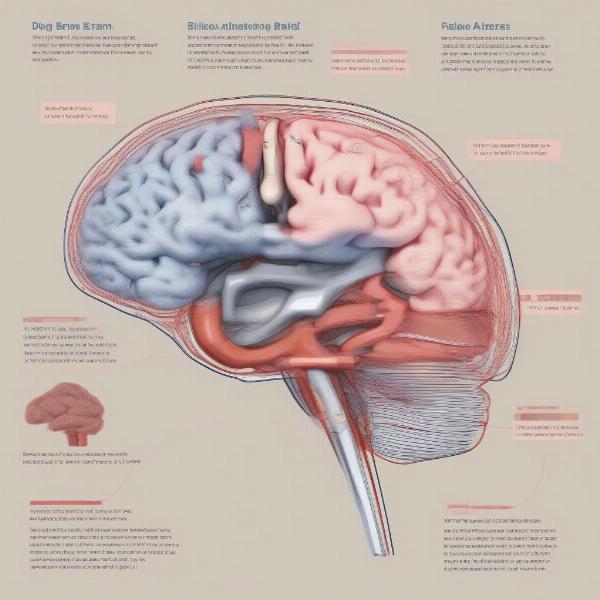If your dog is suddenly acting drunk and wobbly, it’s understandably alarming. This unusual behavior can range from mild stumbling to complete loss of coordination and could indicate a serious underlying health issue. It’s crucial to understand the potential causes and take swift action. This article explores the various reasons why your canine companion might be exhibiting these symptoms, from inner ear infections to more severe conditions, and guides you on what steps to take.
Understanding the “Drunk and Wobbly” Behavior in Dogs
A dog exhibiting “drunk and wobbly” behavior might stumble, stagger, sway, circle, or even fall. They may also appear disoriented, tilt their head, or experience nausea and vomiting. This behavior, known as ataxia, indicates a neurological issue affecting their balance and coordination. Recognizing these symptoms is crucial for prompt diagnosis and treatment.
Possible Causes of Sudden Ataxia in Dogs
Several factors can contribute to sudden ataxia in dogs, ranging from relatively benign issues to life-threatening conditions.
Inner Ear Infections
One of the most common causes is an inner ear infection, also known as vestibular disease. These infections can disrupt the dog’s balance system, leading to disorientation, head tilting, and wobbly gait.
Ingestion of Toxins
Another potential cause is the ingestion of toxins. Household cleaning products, certain human medications, and even some plants can be poisonous to dogs, causing neurological symptoms like ataxia.
Strokes or Neurological Conditions
More serious causes include strokes, brain tumors, or other neurological conditions. These conditions can disrupt brain function, affecting motor control and balance.
 Dog with Neurological Condition
Dog with Neurological Condition
Hypoglycemia and Other Metabolic Issues
Metabolic issues, such as hypoglycemia (low blood sugar), can also manifest as ataxia. This is particularly common in smaller breeds or puppies.
What to Do if Your Dog is Acting Drunk and Wobbly
If your dog displays these symptoms, seek immediate veterinary attention. The veterinarian will conduct a thorough physical examination and may recommend diagnostic tests, such as blood work, urinalysis, or imaging (X-rays, MRI, CT scan) to determine the underlying cause. Early diagnosis and treatment are crucial for a positive outcome.
Preventing Ataxia in Dogs
While not all causes of ataxia are preventable, some measures can help reduce the risk. Store household chemicals and medications safely out of your dog’s reach. Regularly check your yard for poisonous plants. Maintaining regular veterinary check-ups can help detect and address potential health issues early on.
Conclusion
Witnessing your dog acting drunk and wobbly can be frightening. By understanding the potential causes and taking prompt action, you can significantly improve your dog’s chances of a full recovery. Remember, immediate veterinary attention is crucial in these situations.
FAQ
- Is vestibular disease contagious in dogs? No, vestibular disease is typically caused by inner ear infections and is not contagious to other dogs or humans.
- Can a dog recover from ataxia? The prognosis depends on the underlying cause. Some causes, like inner ear infections, often resolve with treatment. More serious conditions may require long-term management.
- What are the signs of toxin ingestion in dogs? Besides ataxia, other signs may include vomiting, diarrhea, tremors, seizures, and changes in behavior.
- How can I prevent my dog from ingesting toxins? Store all potentially harmful substances out of reach, secure trash cans, and supervise your dog during walks.
- What are the treatment options for ataxia in dogs? Treatment varies depending on the cause and may include medications, supportive care, or even surgery in some cases.
- How can I make my dog comfortable if they are experiencing ataxia? Provide a safe, quiet space with soft bedding. Avoid moving them unnecessarily and offer water frequently.
- Should I induce vomiting if I suspect my dog has ingested a toxin? Only induce vomiting if instructed by your veterinarian or a pet poison control center. Some toxins can cause further damage if vomited.
Suggested Further Reading on ILM Dog
(If applicable – add links to relevant articles within ilmdog.com, e.g., articles on specific dog breeds, health issues, or toxin ingestion.)
About ILM Dog
ILM Dog (ilmdog.com) is your trusted global resource for expert advice on dog care and wellbeing. We offer comprehensive guides on everything from breed selection and puppy care to senior dog health, training, nutrition, and grooming. Whether you’re a seasoned dog owner or just starting your journey, ILM Dog provides practical, reliable information to help you give your furry friend the best possible care. For personalized advice or to discuss your dog’s specific needs, contact our team of experts at [email protected] or call us at +44 20-3965-8624. We’re committed to supporting you and your canine companion every step of the way.